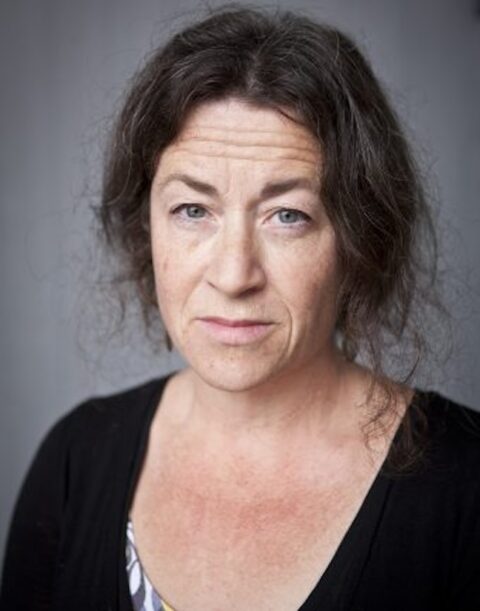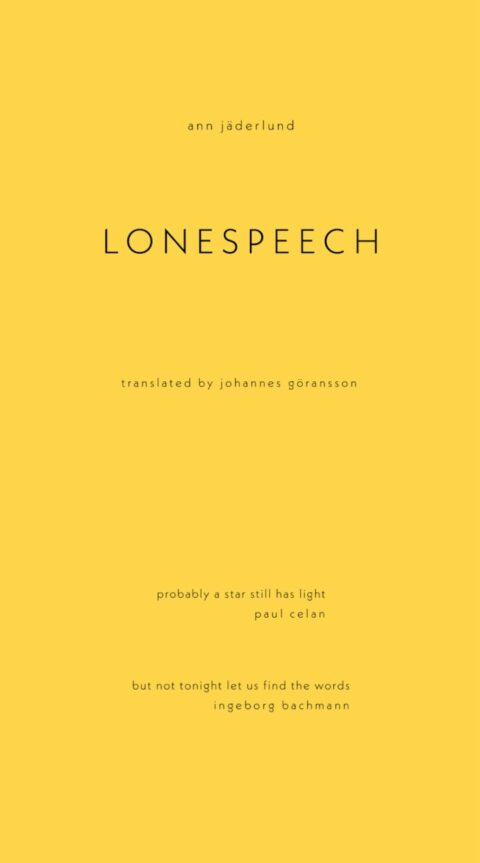 From early on in her career, Ann Jäderlund and her work have been in dialogue with Paul Celan’s poetry. It’s evident in her influential and controversial second collection, Which once had been meadow, with its syntactic twists and turns, its intensive use of apostrophe (“You cannot conceal me” ends the first poem) and in the critics’ charging her with “hermeticism” (a charge famously directed at Celan as well). The connection between the two is even more overt in her latest book, Ensamtal (Lonespeech in my translation), a book that writes through the correspondence between Celan and Ingeborg Bachmann. It’s there on the very cover of the book: one line by Celan (“probably the star still has light”) and one by Bachman (“but not tonight let us find the words”). These quotes telegraph the mode of Jäderlund’s book, what I – writing about translation – have called “transgressive circulation.” As when we receive letters, she is taking foreign words – in this case, words translated from a foreign language – into her own body, her own writing. But in the process she is transforming those words, generating a deformation zone in which the identities of original and translation, authors and languages become destabilized, dynamic, volatile. Which is the original text? Can a translation be an original? Are any texts originals? I too participate in this transformational zone as her translator. After translating her poems, I begin to think and write in torquey, short phrases, using linebreaks that cut and suture semantics and sounds. Just as Socrates/Plato feared, the foreign text has overtaken me. And just as they feared, the foreign text is bound for misunderstandings, deformations, corruptions. This is in large part what Ensamtal is “about”: inhabiting the zones in which meanings and language metamorphize. But the book is also about violence, genocide. Oblique references (such as the word “ister”, or lard) are punctums that bleed this violence into the poems. I didn’t really understand that when I started to translate the book. In fact, I didn’t really understand it fully even when I’d finished translating the book and found a publisher for it. It came to me on a visceral level two months ago one night when the news footage from Israel’s bombing of Gaza – blood, dust, explosives, bodies – replayed in my mind and I felt like something was inside of me. Some thing. I thought it was an an alien or a parasite, but then something – something like a voiceless voice – informed me it was the poem. Jäderlund’s poem. I had finally taken the poem inside my body. Since then, when I read these poems out loud I read them very slowly. The poems are so short, I have to read them slowly or they would pass in a second. And I want to make sure that I can truly feel the words in my mouth before I release them to the audience. I invite you – the reader – to participate in this transgressive circulation of Jäderlund’s poetry by taking these words into your mouth.
From early on in her career, Ann Jäderlund and her work have been in dialogue with Paul Celan’s poetry. It’s evident in her influential and controversial second collection, Which once had been meadow, with its syntactic twists and turns, its intensive use of apostrophe (“You cannot conceal me” ends the first poem) and in the critics’ charging her with “hermeticism” (a charge famously directed at Celan as well). The connection between the two is even more overt in her latest book, Ensamtal (Lonespeech in my translation), a book that writes through the correspondence between Celan and Ingeborg Bachmann. It’s there on the very cover of the book: one line by Celan (“probably the star still has light”) and one by Bachman (“but not tonight let us find the words”). These quotes telegraph the mode of Jäderlund’s book, what I – writing about translation – have called “transgressive circulation.” As when we receive letters, she is taking foreign words – in this case, words translated from a foreign language – into her own body, her own writing. But in the process she is transforming those words, generating a deformation zone in which the identities of original and translation, authors and languages become destabilized, dynamic, volatile. Which is the original text? Can a translation be an original? Are any texts originals? I too participate in this transformational zone as her translator. After translating her poems, I begin to think and write in torquey, short phrases, using linebreaks that cut and suture semantics and sounds. Just as Socrates/Plato feared, the foreign text has overtaken me. And just as they feared, the foreign text is bound for misunderstandings, deformations, corruptions. This is in large part what Ensamtal is “about”: inhabiting the zones in which meanings and language metamorphize. But the book is also about violence, genocide. Oblique references (such as the word “ister”, or lard) are punctums that bleed this violence into the poems. I didn’t really understand that when I started to translate the book. In fact, I didn’t really understand it fully even when I’d finished translating the book and found a publisher for it. It came to me on a visceral level two months ago one night when the news footage from Israel’s bombing of Gaza – blood, dust, explosives, bodies – replayed in my mind and I felt like something was inside of me. Some thing. I thought it was an an alien or a parasite, but then something – something like a voiceless voice – informed me it was the poem. Jäderlund’s poem. I had finally taken the poem inside my body. Since then, when I read these poems out loud I read them very slowly. The poems are so short, I have to read them slowly or they would pass in a second. And I want to make sure that I can truly feel the words in my mouth before I release them to the audience. I invite you – the reader – to participate in this transgressive circulation of Jäderlund’s poetry by taking these words into your mouth.
— Johannes Göransson
/ / /
Multireversable
and lost
it comes back
again
lards
alongside
alone
seeps through
but what
when the arnica
blooms yellow
the yellow
spot
becomes
visible
it is said
* * * * *
You yourself cut
up the eye
or pricked it
with a
thin needle
I understand that
not a second
even a single
second
* * * * *
Before the limit is reached
comes a moment
that quickly passes
or even had time
to exist
the smoke goes into the eye
the eye into the smoke
also they have
only that grave
* * * * *
Right hand
not by my hand
right eye
which waits and stings
maybe was cut out of
the left preceding
scoop and tears
gnaws
* * * * *
Clang earth
root worry
if willed
will
clang worry
earth root
/ / / / /
 Lonespeech by Ann Jäderlund, published by Nightboat Books on May 21, 2024, 96 pages, $17.95 paperback. To acquire a copy directly from the press, click here.
Lonespeech by Ann Jäderlund, published by Nightboat Books on May 21, 2024, 96 pages, $17.95 paperback. To acquire a copy directly from the press, click here.